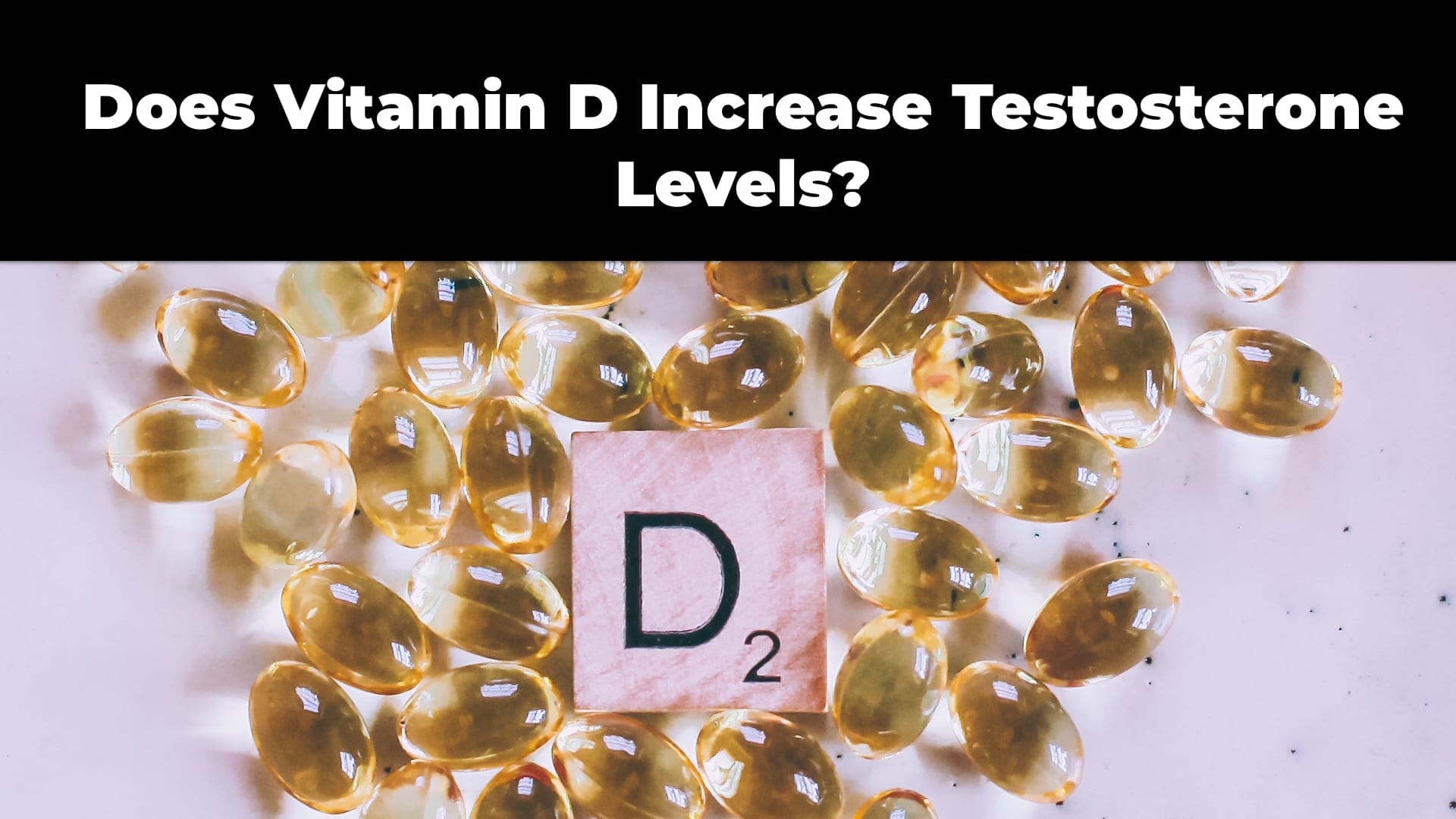
Does vitamin D increase testosterone levels? Research suggests a potential link, especially in those with deficiencies. This article examines the evidence, discusses how vitamin D influences testosterone, and offers guidance on managing your levels effectively.
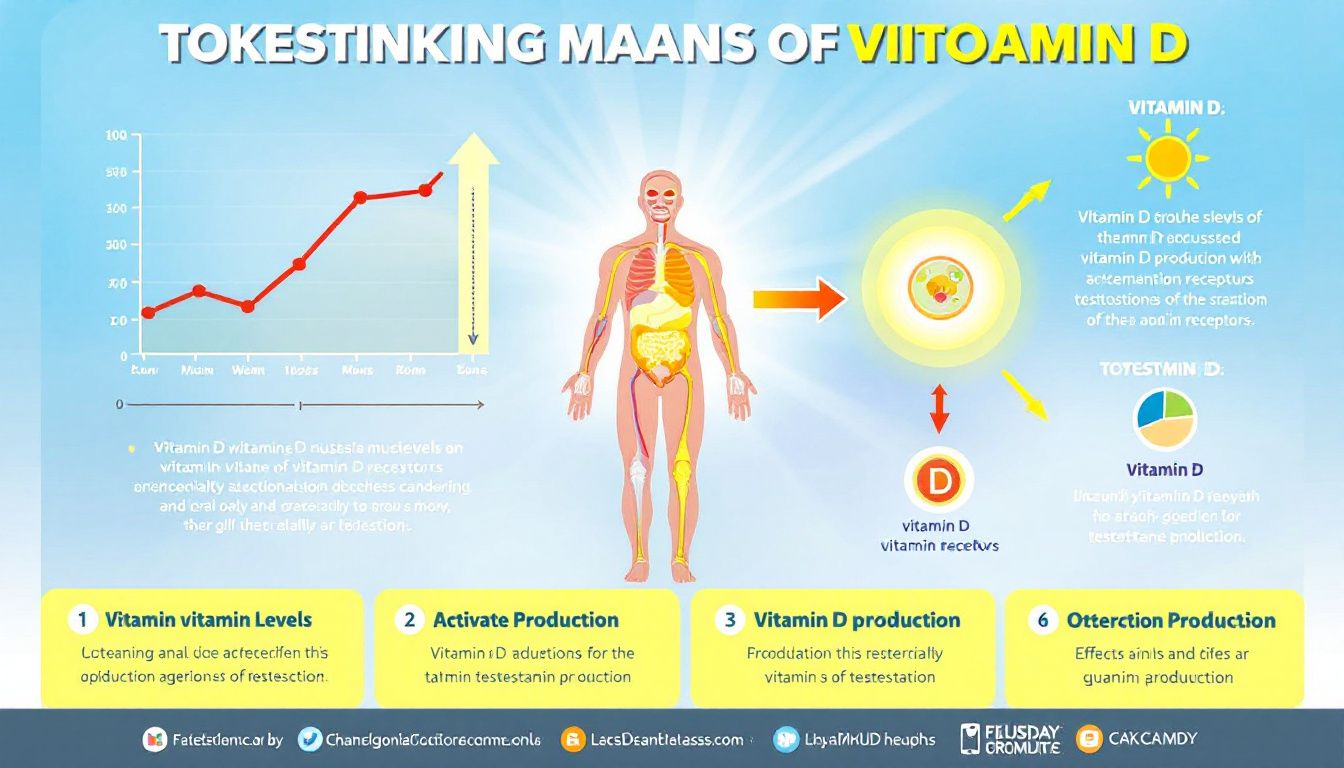
Vitamin D, often known as the “sunshine vitamin,” is essential for many bodily functions. Its active form, calcitriol, aids in calcium absorption and bone health. While natural food sources like mushrooms and fatty fish can provide some vitamin D, our bodies primarily synthesize it through sunlight exposure.
Given the difficulty of obtaining enough vitamin D from diet alone and the risks of sun exposure, many health professionals recommend supplements to maintain proper levels.
Vitamin D deficiency is a global issue affecting many populations. In Australia, about 23% of adults have some level of deficiency. This can lead to weakened immune function, poor bone health, and a higher risk of chronic diseases. The serum vitamin D concentration is a critical marker of overall health, and low levels can have far-reaching consequences.
Vitamin D deficiency is also linked to low testosterone, which can worsen symptoms like decreased motivation and feelings of sadness, and increase cardiovascular disease risk. This interplay underscores the importance of maintaining adequate vitamin D levels to support both immune function and hormonal balance.
While necessary, too much vitamin D can be harmful. Excessive intake, especially from high-dose supplements, can cause hypervitaminosis D, characterized by high blood calcium levels, leading to nausea, frequent urination, and kidney issues. Monitoring vitamin D levels before supplementation can help avoid these risks.
Symptoms of vitamin D toxicity, like dehydration and joint pain, underscore the need to adhere to recommended dosages. Understanding the balance between deficiency and excess is key to maintaining proper vitamin D status and overall health.
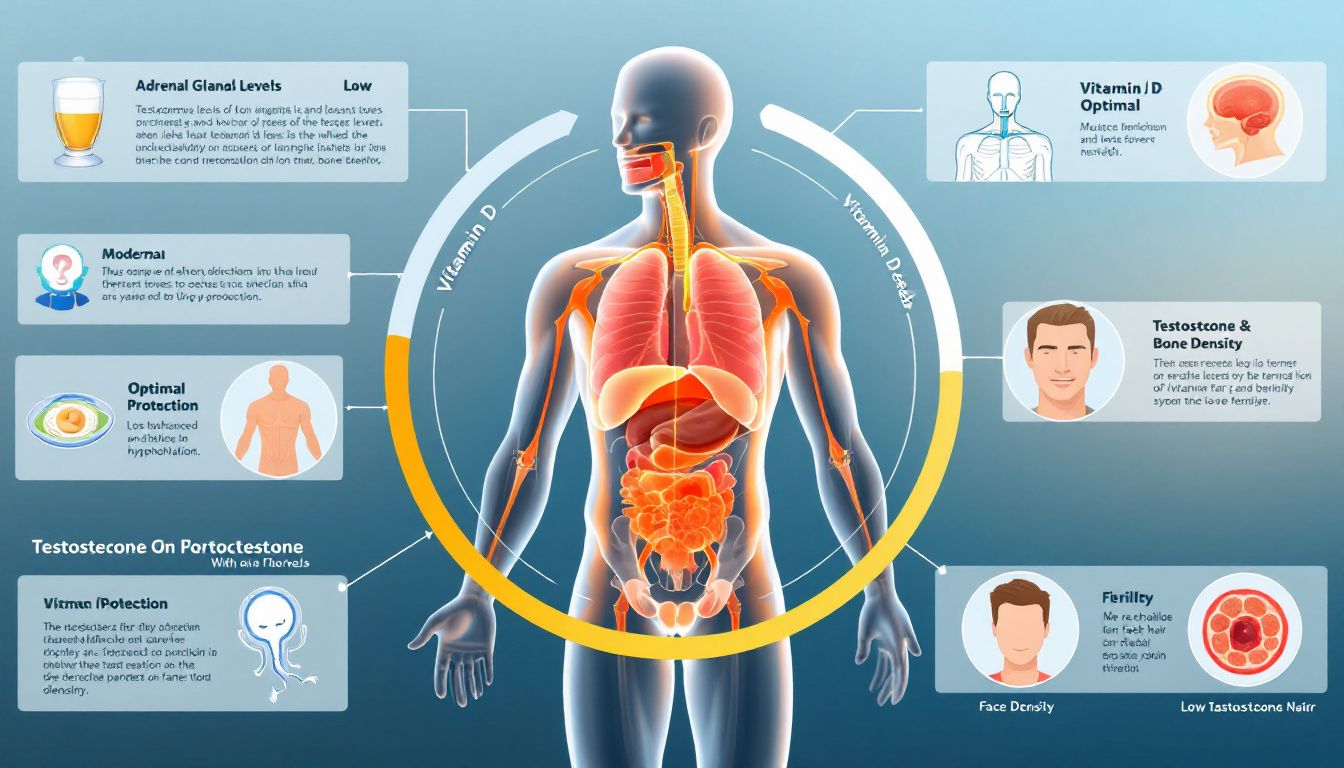
Testosterone is fundamental to human health, affecting bone strength, muscle mass, libido, mood, tissue recovery, and red blood cell production in both men and women. Regular physical activity and a diet rich in healthy fats can naturally support testosterone production.
Incorporating high-antioxidant foods, such as pomegranates and dark chocolate, can protect testosterone-producing cells from oxidative stress. A balanced diet and regular exercise are key for optimal testosterone levels and overall well-being.
Testosterone exists in two main forms in the bloodstream: bound and free testosterone. Proteins like albumin and sex hormone-binding globulin (SHBG) transport testosterone throughout the body, with bound testosterone accounting for about 97-98% of the total. While bound testosterone is biologically inactive, free testosterone, which makes up about 1-3% of the total, is the active form that interacts with receptors in the body.
Research shows a positive association between vitamin D levels and both total and free testosterone. Serum testosterone concentrations and vitamin D concentrations predict total testosterone, highlighting the need to maintain adequate vitamin D for hormonal health.
Low testosterone can affect both physical and emotional health. Men may experience decreased motivation and feelings of sadness, increased body fat, reduced muscle strength, and sexual dysfunction.
Additionally, men with low testosterone are at higher risk for cardiovascular issues, obesity, and depression. These symptoms highlight the importance of maintaining healthy testosterone levels for overall well-being and quality of life.
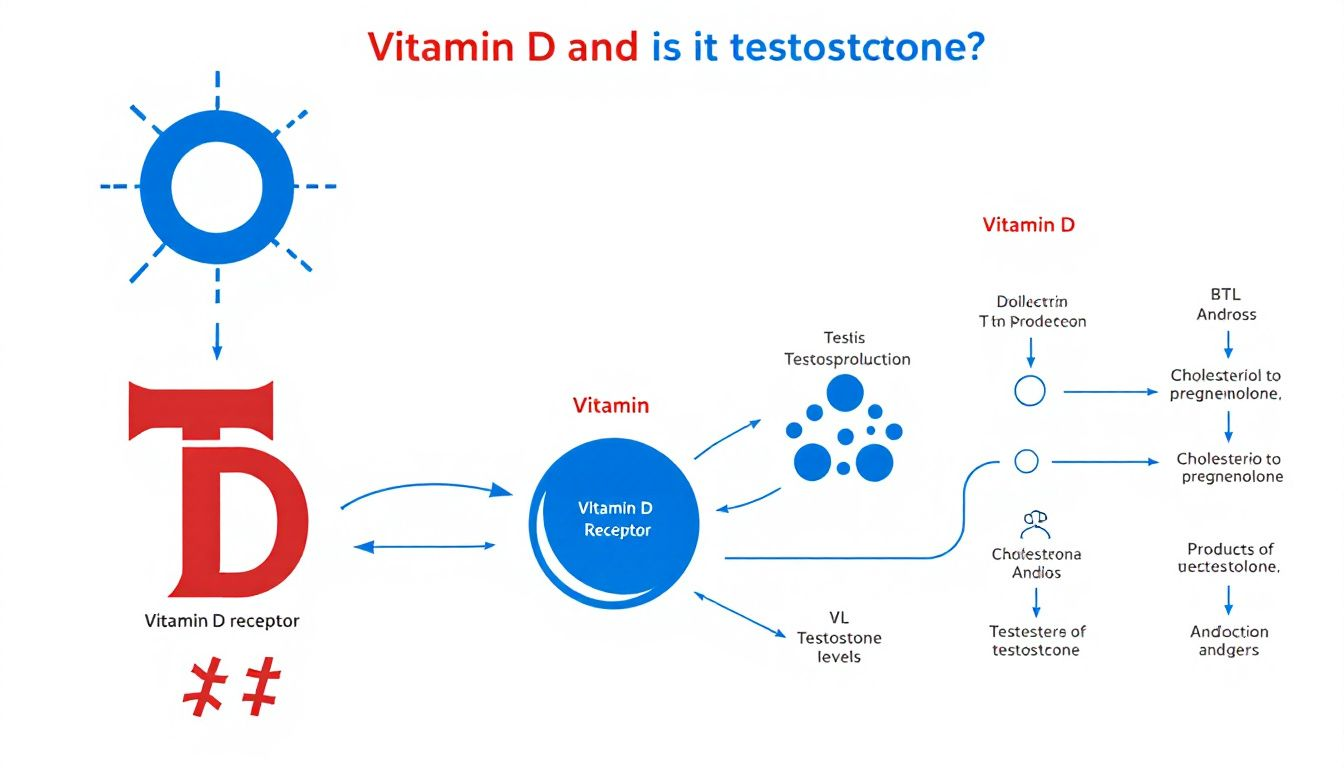
Research indicates a significant link between vitamin D and testosterone levels, especially in those deficient in both. Supplementation may boost testosterone in vitamin D-deficient men. Adequate vitamin D can influence testosterone production, stressing the need to monitor and manage vitamin D levels.
In women, vitamin D status has also been linked to the regulation of testosterone levels, suggesting potential benefits for reproductive health. Maintaining optimal vitamin D levels is crucial for supporting hormonal balance and overall health.
Studies show that men with sufficient vitamin D levels tend to have higher testosterone. A 2016 study found that men with optimal vitamin D had significantly higher testosterone than those with low levels. A systematic review of multiple studies consistently found that vitamin D supplementation led to increases in testosterone levels in certain populations.
These findings suggest that addressing vitamin D deficiency may be a viable strategy for improving testosterone levels. However, it is important to note that results can vary across different populations.
Despite positive correlations, findings on vitamin D supplementation’s effects on testosterone are mixed. Some studies found no significant changes in certain populations. This variability suggests that individual responses to supplementation can differ widely.
More research is needed to fully understand the relationship between vitamin D and testosterone. Personalized approaches may be necessary to determine the most effective strategies for each individual.
Understanding how vitamin D influences testosterone provides valuable insights into hormonal health. Vitamin D is crucial for testosterone production, affecting various bodily functions. Higher vitamin D levels can enhance testosterone production, vital for overall health and well-being.
This section will explore the roles of the vitamin D receptor and sex hormone-binding globulin (SHBG) in this process.
The vitamin D receptor (VDR) is a critical component in mediating the biological effects of vitamin D in the body. Activation of the VDR can lead to increased expression of proteins involved in testosterone synthesis. This enhancement of protein expression directly contributes to the overall increase in testosterone production.
Understanding the VDR’s role in testosterone synthesis offers insights for interventions targeting testosterone levels through vitamin D. This knowledge can aid in developing effective strategies to address testosterone deficiencies.
Sex hormone-binding globulin (SHBG) regulates testosterone’s bioavailability. Vitamin D can influence SHBG levels, affecting free testosterone and free bioavailable testosterone levels. Men with lower vitamin D levels tend to have reduced SHBG and a rise in free testosterone.
In women, a decrease in vitamin D levels correlates with reduced SHBG and an increase in free testosterone. These findings suggest that maintaining adequate vitamin D levels is essential for regulating SHBG concentrations and ensuring optimal testosterone bioavailability.
Vitamin D supplementation is of interest for its potential to boost testosterone. Some studies show significant increases in deficient men, while others found no mean testosterone increase.
The effectiveness of supplementation appears to depend on baseline vitamin D and testosterone levels.
Randomized controlled trials (RCTs) are crucial for determining vitamin D supplementation’s effectiveness on testosterone levels. One study showed that men who received vitamin D supplements experienced a notable increase in total testosterone levels compared to the placebo group. These findings suggest that vitamin D supplementation may play a crucial role in enhancing testosterone production, thereby potentially improving men’s hormonal health.
Overall, the evidence supports the potential benefits of vitamin D supplementation in increasing testosterone levels, warranting further exploration and consideration. However, not all studies have found significant differences, indicating that individual variability must be considered.
Proper vitamin D supplementation is key for optimal health and hormonal balance. The recommended daily dosage for most adults is 600 to 800 IU, but higher amounts may be needed for deficiencies. If someone with optimal vitamin D levels takes supplements, it is unlikely to affect testosterone levels and may lead to excess vitamin D.
Consult a healthcare professional before starting any dietary supplements to avoid potential side effects and interactions. Proper supplementation practices can help ensure adequate vitamin D levels without risking toxicity.
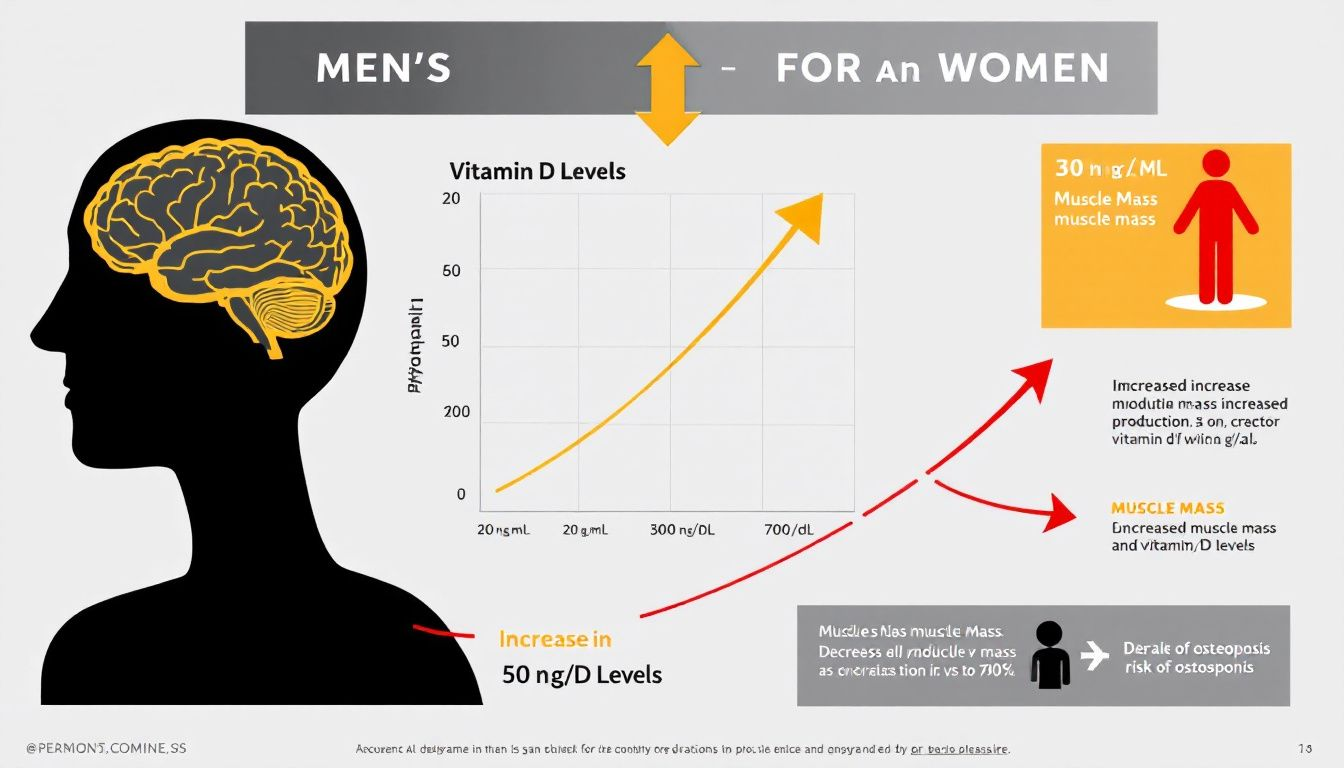
Vitamin D and testosterone levels interact to influence various health aspects, including mood and energy. These interactions can vary by gender, indicating the need for gender-specific studies. Vitamin D receptors are present in the male reproductive system, suggesting that vitamin D may contribute to male hormone synthesis. In women, vitamin D’s regulation of testosterone levels suggests potential benefits for reproductive health.
The health impacts of vitamin D and testosterone interactions vary between men and women due to differences in hormone regulation. Understanding these differences is key for developing targeted interventions.
Vitamin D plays a crucial role in testosterone production and overall male reproductive health. Several studies show that vitamin D supplementation can significantly increase testosterone in men with low vitamin D. A systematic review found a correlation between supplementation and increased testosterone in deficient men.
However, men with normal vitamin D levels did not see testosterone increases from supplementation, suggesting benefits may be more pronounced in those with testosterone deficiency.
The presence of vitamin D receptors in various cells within the male reproductive tract further supports its role in male fertility processes.
A positive correlation exists between vitamin D and total testosterone levels in women. Adequate vitamin D may improve testosterone function and overall health in women. Understanding the relationship between vitamin D and female testosterone can lead to better health outcomes and targeted supplementation strategies.
Vitamin D is increasingly being recognized for its influence on hormone regulation in the body. Ensuring proper vitamin D levels can support hormonal balance and enhance reproductive health in women, emphasizing the importance of regular monitoring and appropriate supplementation.
Regular monitoring of vitamin D and testosterone levels is crucial for identifying deficiencies and guiding supplementation. Managing these levels requires caution due to potential health risks.
This section provides guidance on self-monitoring techniques and nutrition and lifestyle tips to help maintain optimal levels.
Home test kits can help individuals track their vitamin D and testosterone levels. These kits allow sample collection, which are then sent to a lab for analysis, providing a preliminary measure of hormone levels. It is crucial to follow specific instructions when using at-home test kits to ensure accurate results.
Regular monitoring can identify deficiencies early and guide supplementation strategies, allowing individuals to maintain healthy levels and avoid complications.
Including fatty fish, fortified dairy products, and egg yolks in the diet can significantly boost vitamin D levels. Vitamin D supplements, particularly D3, are effective for individuals with limited sun exposure.
Engaging in regular physical activity, such as weight lifting and high-intensity training, can help stimulate testosterone production and increase serum testosterone levels. Balancing a nutrient-rich diet with a healthy lifestyle, including stress management and adequate sleep, is key for optimal testosterone and vitamin D levels.
Monitoring vitamin D levels before supplementation is recommended to avoid potential toxicity, particularly in those with adequate vitamin D status. Excessive intake of vitamin D can lead to toxicity, emphasizing the need for careful management and monitoring during supplementation.
This section discusses the health risks of low testosterone and high-dose vitamin D intake.
Low testosterone levels can increase the risk of developing cardiovascular issues, including heart disease. Testosterone plays a crucial role in various bodily functions, influencing overall well-being. Other health problems linked to low testosterone include sexual dysfunction and decreased physical performance.
Maintaining healthy testosterone levels helps prevent associated risks like heart disease and sexual problems. Regular monitoring and appropriate interventions can help manage these risks and support overall health.
High-dose vitamin D intake can pose significant health risks, particularly through supplementation rather than from dietary sources or sun exposure. Toxicity from vitamin D typically arises from high-dose supplements rather than dietary sources or sun exposure. Monitoring blood levels is crucial when taking high doses of vitamin D to avoid potential health risks.
Safe supplementation practices can mitigate the risks associated with vitamin D intake. Consulting a healthcare professional before starting any supplementation regimen ensures safety and effectiveness.
Understanding the interplay between vitamin D and testosterone is crucial for overall health and well-being. While there is evidence supporting the benefits of vitamin D supplementation for boosting testosterone levels in individuals with deficiencies, it is important to approach supplementation with caution and under professional guidance.
For those looking to boost testosterone naturally, Tongkat Ali is a well-studied and safe option, showing promise in increasing testosterone levels and improving hormonal health. However, it’s always best to consult with a healthcare professional before starting any new supplement to avoid potential side effects and interactions.
To sum up, vitamin D and testosterone are interconnected elements vital for our health. Maintaining adequate levels of both can support various bodily functions, from bone health to emotional well-being. By understanding the relationship between these two, monitoring their levels, and adopting proper supplementation and lifestyle practices, we can enhance our overall health and quality of life. Take control of your health today and harness the power of vitamin D and testosterone!
Absolutely! If you’re vitamin D deficient, supplementation can boost your testosterone levels.
Low testosterone can show up as emotional changes, added body fat, weaker muscles, sexual dysfunction, and an increased risk of heart problems. If you notice these symptoms, it might be worth checking in with a healthcare professional.
Too much vitamin D can really mess with your body, leading to high calcium levels, nausea, and even kidney issues. It’s best to stick to recommended doses to avoid these risks.
You can easily monitor your vitamin D and testosterone levels using home test kits, which provide a convenient way to keep track of your health. Regular checks can help you adjust your supplementation as needed.
Absolutely, Tongkat Ali has been shown to be effective in boosting testosterone levels and supporting hormonal health. If you’re considering it, many people have reported positive results!
Copyright 2026 Tongkat Ali Australia, all rights reserved